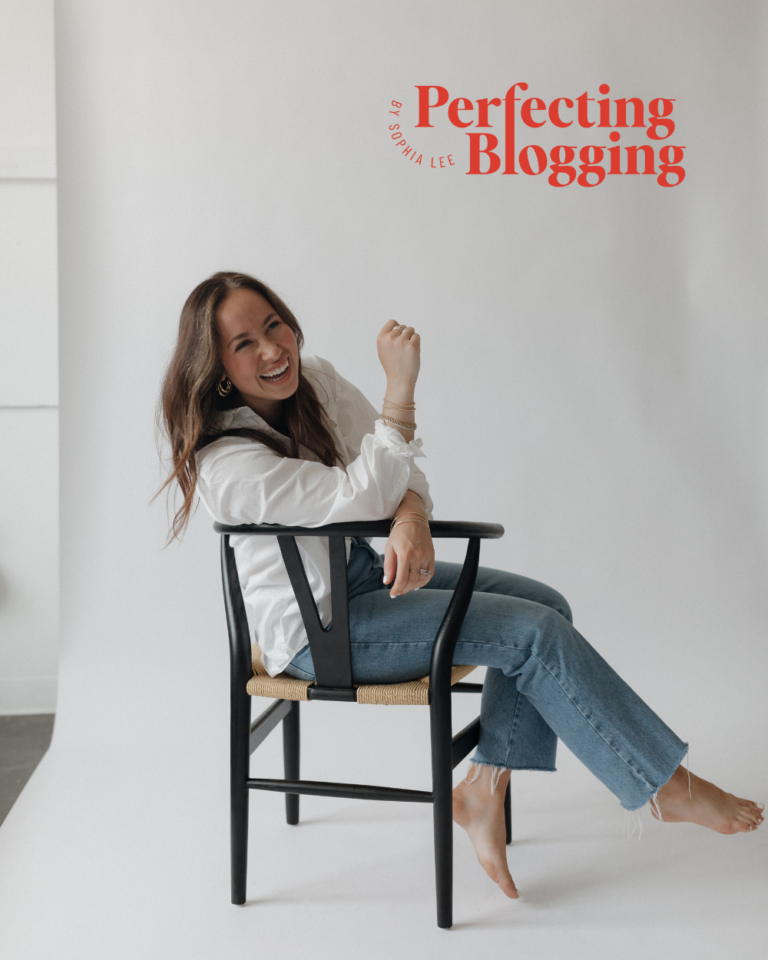Thinking of what to do before starting a blog? Scratch everything you’ve read on how to start a blog and read this first!
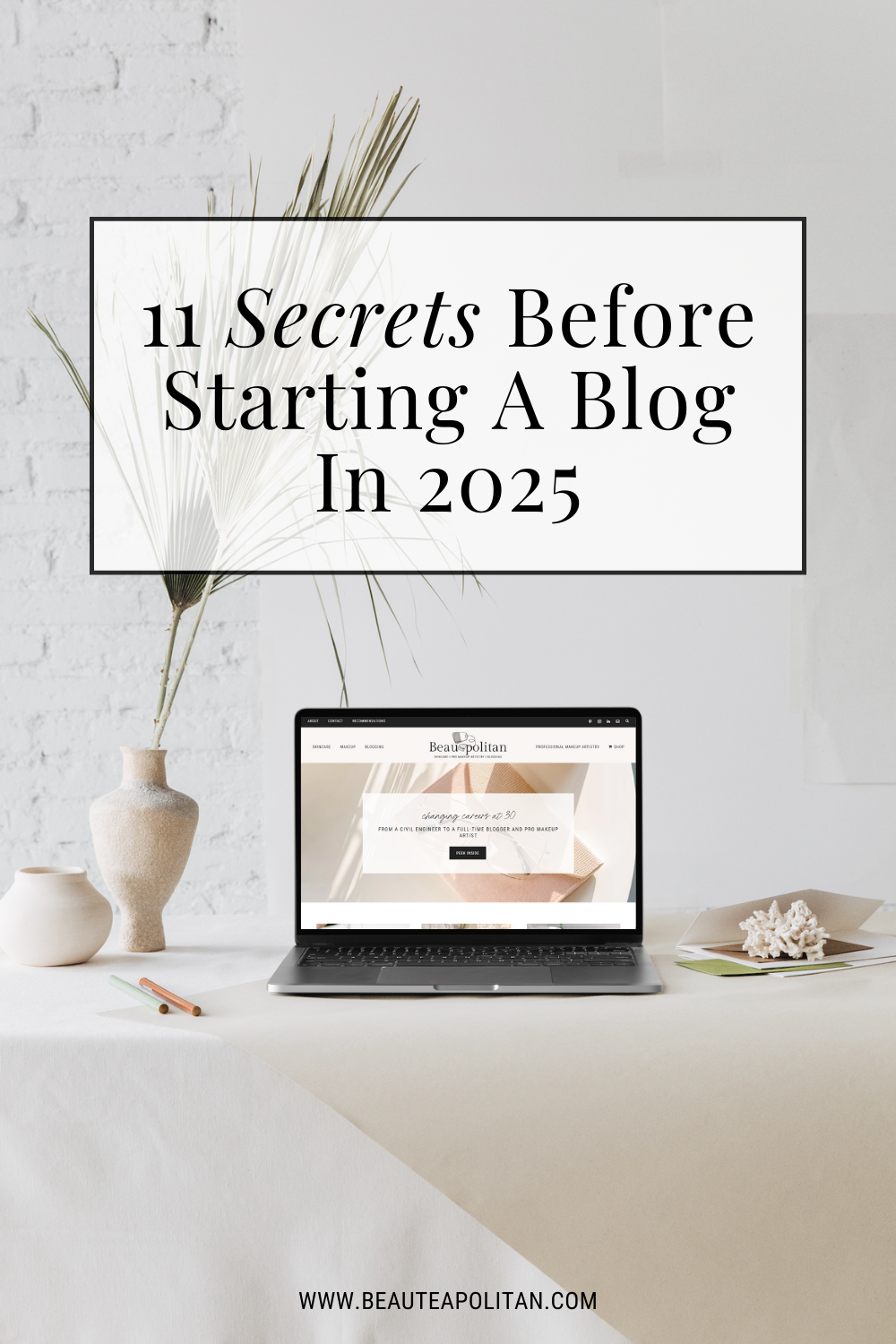
Blogging sounds so fun and exciting when you’re new and if you’re anything like me who’s a writer by heart, you see blogging as your creative outlet. As a relatively new blogger myself, I’m giving you the secrets I wish I knew before I started blogging.
This isn’t just another how-to guide! This is a behind-the-scenes look at what really matters before you start your blogging journey. You’ll learn all about the key information about blogging, what to blog about, how to plan a blog, and why write a blog in the first place.
You’ll also know the best places to learn basic SEO which is the most important technical aspect of blogging. More on that later!
This post is all about the 11 secrets that most blogging “experts” don’t tell you before starting a blog. Spilling the tea here so that you’re extra prepared before starting a blog in 2025.
Before Starting A Blog
1. Set Your Blogging Mindset and Know Your Why
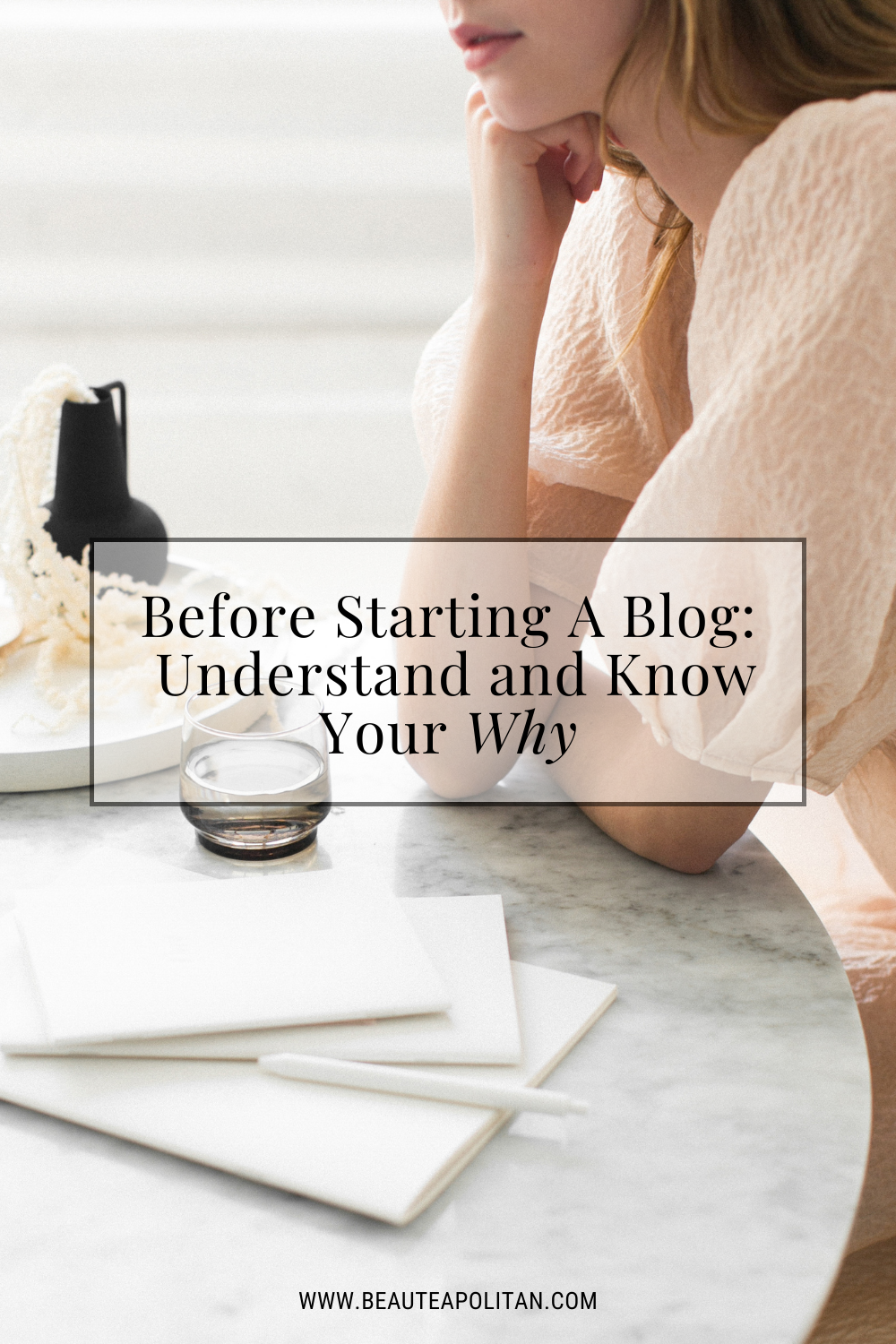
I’ve seen too many tutorials and received email newsletters on how to start a blog. But none was about why. I see people just diving headfirst into blogging without a clear purpose.
Let’s start with the big question: why do you want to blog? Is blogging a creative outlet for you? Is it just a hobby? Or do you plan to make money off of it?
In this post, though, we’ll not cover how to monetize your content. You’ll know why in the next section.
But blogging can definitely be your creative outlet. I know the experience of having fun crafting soulful content, getting lost in endless ideas while exploring different topics and feeling fulfilled when sharing your experiences with your readers.
While blogging may start as a hobby or your little creative corner on the web, it can also evolve into a potential source of income. It has been proven so many times by other bloggers who were SO clear on what they want and why they’re doing what they’re doing in their blog. My personal favorite is Sophia Lee.
Because of this, you MUST get clear on your why before starting a blog. As for me, it’s both a creative outlet and a potential source of income. I treat blogging as a business.
Your why will dictate your path as you learn today or later in your blogging journey.
Understanding your why is the most important thing you should know about before starting a blog. It’ll give you clarity and direction that will guide your strategies later. And if you don’t have any strategies yet, don’t worry, you don’t need to overthink it right now.
Now, here are some questions you should reflect on yourself to know why write a blog in the first place:
- What do I want to achieve with my blog?
- What topics or interests am I passionate about or naturally inclined towards?
- Who do I hope to read my blogs and speak to?
- How will my blog provide value to them?
- What are my long-term goals for my blog?
- What does a successful blog look like to me?
- Am I willing to adapt and evolve as my blog grows?
Here’s the thing: you don’t have to answer these questions right now. Instead, let it linger in your mind. Write these down and you can always come back to any of them later when the answer wakes you up in the middle of the night.
Without a clear purpose before starting a blog, you’ll get pulled in too many directions and you’ll get lost.
Lastly, it’s important to know your why upfront and remember it because it’s really easy to give up when things get hard. Your why will serve as a motivation and be a driving force to a more fulfilling and successful blog.
2. You Don’t Get Rich Overnight
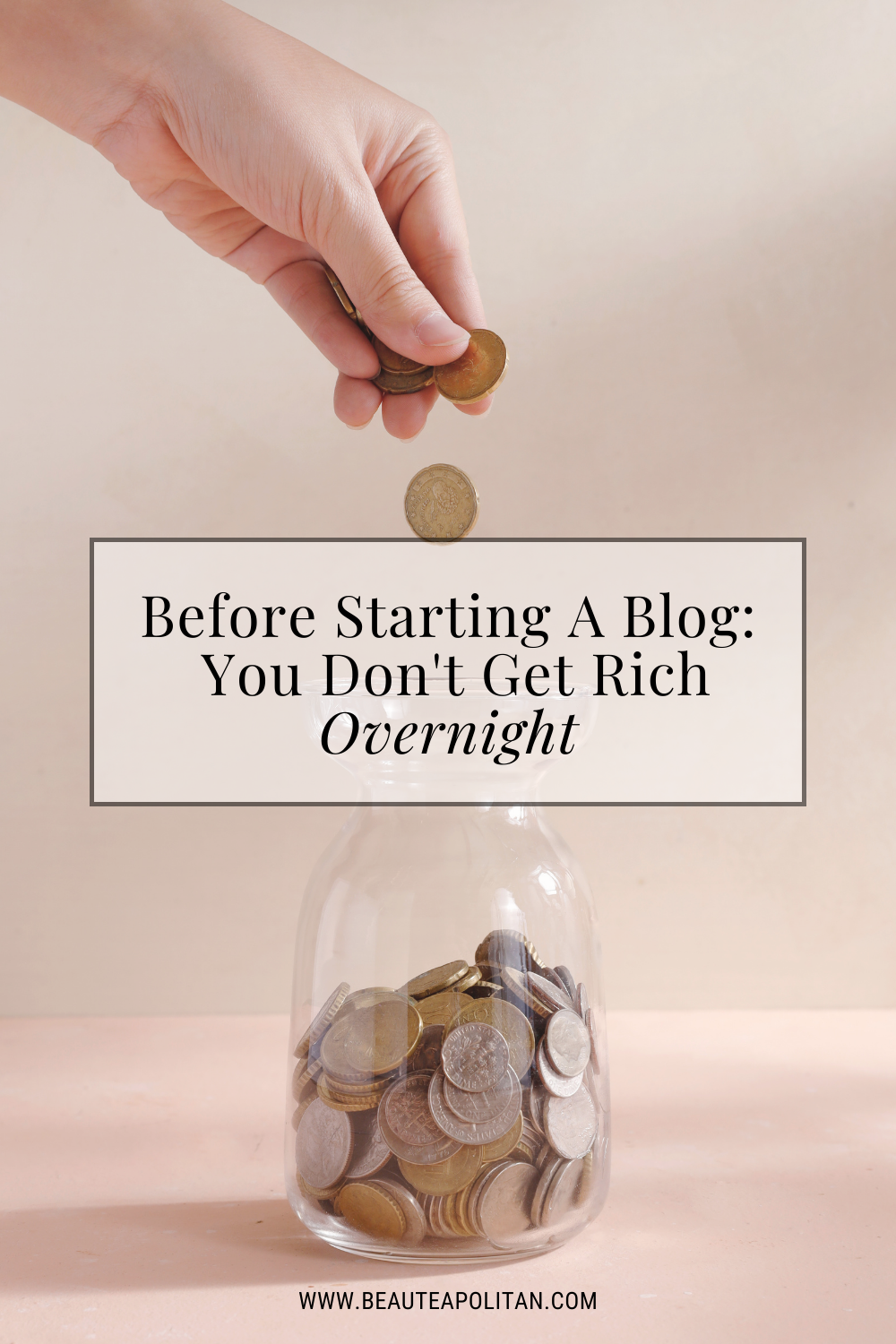
Alright, if you want to make your blog a hobby, you can skip this part.
One misconception about blogging is that it makes money overnight. Haha!
Hate to break it to you but blogging isn’t a get-rich-quick scheme! So don’t be fooled by those YouTube thumbnails because blogging experts usually make it sound easy when it’s actually the opposite.
Making money blogging isn’t impossible but you bet it will take time. Here are some of the reasons why:
- When you’re starting out, writing a blog can take up to 4 to 6 hours of your undivided attention.
- Beginners often feel overwhelmed by their lengthy to-do lists, leading them to become scattered or give up altogether.
- You’ll have to invest your time learning the technical side of blogging.
- Google does not guarantee indexing of all website pages. Meaning, your blog post can remain unseen for a long time. It can take up to 2 to 3 months on average.
So, in your first 6 months of blogging consistently, assuming you put out enough content for Google to notice you, you can’t really make money yet. Instead, you’ll build a habit that will set your efforts to yield fruitful results.
Blogging isn’t a fast game. You don’t get to post once or twice a month and expect monthly income off your blog! Trust me, I’ve been there and it’s frustrating.
But I know now that you’ll have to do the backend work for months and not get seen. And it’s normal.
So, just keep on uploading your posts. If possible, at least once a week.
3. Don’t Spend Your Money Just Yet

When you hear a blogging expert endorse tools to boost your blog, pause it and consider if you absolutely need it now at the start of your blogging journey.
First, you’ll need to consider lots of expenses when you want to start a blog. But when you think about it, and if you’re like me who treats her blog as a business, the start-up cost of this business is amazingly low compared to when you open a brick-and-mortar one.
So I understand that it can be tempting to spend your money on things that are nice to have but are not necessary yet.
While there are countless enticing options to enhance your blog, focusing on the essentials only as of now is crucial to ensure a smooth and cost-effective start.
Here are the only important things you need to invest in when starting your blog:
- Domain – this is your address on the internet and should be a .com.
- Hosting provider – this is where you’ll store your website and make it available on the internet.
- Theme – this will make your website look pretty and put together. A clean, attractive design and a user-friendly interface can keep visitors on your site longer.
These three investments are the backbone of a successful blog launch. They ensure your blog looks professional, runs smoothly, and is accessible to your audience.
As tempting as it might be to purchase various plugins, email marketing services, or advanced SEO tools, these are not essential in the early stages of your blog.
So, I highly suggest that you avoid unnecessary expenses and instead, focus on creating valuable content and building an audience first. Once your blog starts gaining traction, you can consider additional investments to enhance functionality and grow your audience further.
You can also check out my recommendations page to know more. I’ve compiled a list of trusted resources and tools that can help you get your blog off the ground.
Starting a blog doesn’t have to be expensive. I want you to spend the least amount possible at the start of your blog.
By focusing on the essentials and avoiding unnecessary early expenses, you can set a solid foundation for your blog, allowing it to grow and thrive in the long run.
4. The Best Places to Learn Basic SEO
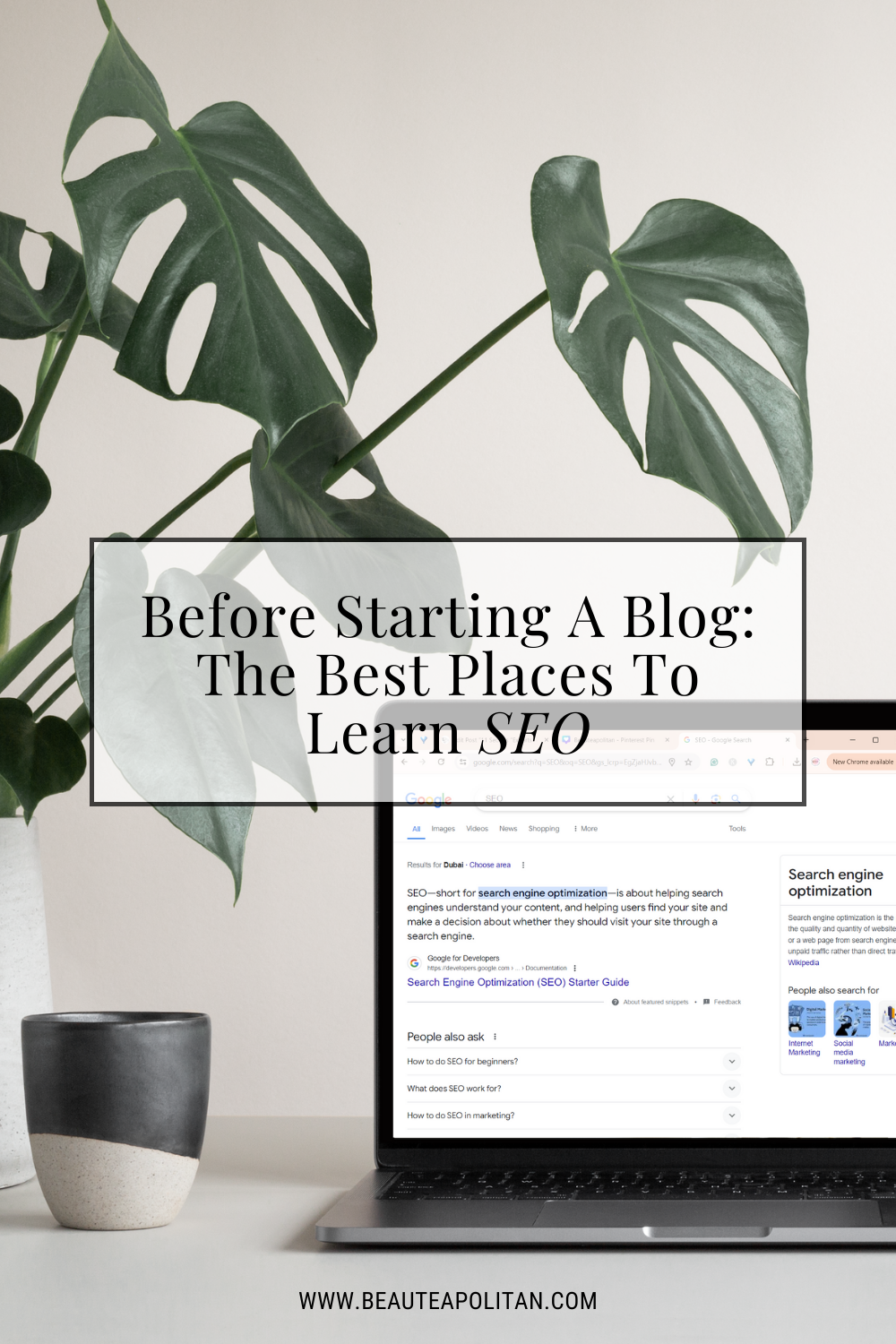
Now to the fun part! If you love learning as much as I do, you’ll enjoy signing up for these SEO courses. Plus, learning about SEO is super important before starting a blog. It can actually make or break your Google rankings!
Before diving into blogging, understanding search engine optimization (SEO) is super important. It will help your website rank higher in search engines like Google. The higher the rank, the more traffic and readership to your website!
In 2025, SEO will most possibly remain a critical factor that can either boost your blog to the top of Google rankings or leave it buried beneath the competition.
Luckily, big and leading companies such as Hubspot, Yoast SEO, and even Google offer FREE and excellent SEO courses. You can even get certificates upon completion too!
The first course I took was a content writing crash course in Edoxi – a training center here in Dubai. Although I got so much out of that course, it was a paid course. And admittedly, I wasn’t as resourceful as I am now and didn’t know about these free courses.
You can sign up for free accounts on the following and learn about SEO. These are the courses blogging “experts” don’t tell you about:
- Hubspot Academy’s SEO Certification Course – I swear by Hubspot Academy! I knew about them from a guy at SEO Sherpa I connected with on LinkedIn. He let me stalk his profile and suggested I take some courses in Hubspot Academy to boost my knowledge about blogging.
- Yoast SEO’s SEO Training – I discovered this course because Yoast SEO was lightly touched on in my Edoxi content writing class.
- Google’s Fundamentals of Digital Marketing (if you’re up for a more challenging course)
But remember, it’s important to learn the basics of SEO without spreading yourself thin in the process. You don’t have to overwhelm yourself with too much information too soon. Focus on mastering the basics before delving into more advanced concepts.
So, take it slow and steady. Slow and steady.
5. The Riches are in the Micro Niches

Before starting a blog, you must have some idea of what you want to blog about. I know you’ve thought of your topic or here in the blogging world, we refer to it as “niche”. But I want you to rethink it again.
One mistake I don’t want you to make is going too broad with your niche. It’s always better to niche down and expand later.
Niching down your blog isn’t just about narrowing your focus. It’s about your specialization to connect deeply with readers who share your passions and interests.
It’s about carving out your own space in the vast digital landscape, where your voice resonates with a specific audience.
When you niche down your blog, you’re essentially sharpening your message and targeting it towards a defined group of people. Instead of casting a wide net and hoping to catch random readers, you’re fishing in a smaller pond where your content is more likely to make waves.
But how do you find your niche? Start by lingering to these questions:
- What are you naturally interested in or passionate about?
- Are there any topics you can’t stop talking about?
- What is your field of expertise?
- Do you have a unique perspective about something?
- Do you have valuable years of experience others can learn from?
Once you’ve identified your niche, it’s time to delve deeper into your chosen topic so you can cater to a more focused audience who are actually interested in what you have to say. And this will set you apart and make you unique from your competitors.
Also, pick a niche that’s not too narrow. Choose one that has the potential to grow later as you evolve as a blogger.
In the ever-expanding blogosphere, niching down isn’t just a strategy—it’s a survival tactic. You unlock the potential for deeper connections by honing in on what sets you apart and speaking directly to a specific audience.
6. Research Any Forms of Content on Your Niche

Relying on your expertise and passion alone can’t help you to be successful in the blogging world. You’ll have to continuously consume helpful content that will help feed ideas to your creative brain.
Getting as much information about blogging with your specific niche in mind can only be found by researching consistently. It will help you know what to blog about and dive deeper into your microniche.
Here are my top tips to help you research your niche better:
- Subscribe to your hero’s email newsletters. Your hero can be that YouTuber you’re following, that magazine you’re reading, or someone that you just admire.
- Try to absorb as much learning from them as possible.
- Observe how they reach and communicate to their audience and try to imitate something from them and incorporate it into your work.
- Diversify your source of news. Watch YouTube videos. Read business books as well as fiction books. Listen to podcasts. Stay up to date on the current events in your community. All these can be beneficial to your creativity and will keep your ideas flowing.
- Join online forums. But a word of caution: select the helpful communities only. There are toxic forums like the ones on Reddit where there are no moderators. I’d highly recommend joining Facebook groups for bloggers. They’re easily found online. And if you don’t like it inside these groups, you can always opt-out.
- Take It Step by Step: It’s important not to overwhelm yourself by trying to do everything at once. You can pick one and observe which form of research works best for you.
Knowing how to customize your own research strategies will help you stay updated and leverage it effectively to craft compelling content that not only aligns with your personal style and niche but also resonates with your audience.
Also, researching more about your niche will help you generate topics to blog about even before you start a blog and be more motivated to do the work.
With all these research tips I’m giving you, I know it’s also easy to fall into analysis paralysis. It’s when you stop creating content and you’re just stuck in learning mode.
I’ve been there and I was stuck for a couple of months. You have to be aware that this is real so you’ll know when you’re in the middle of this situation.
To prevent this or get out of this situation, you’ll have to go easy on yourself and move forward. Just move forward.
7. Nobody Cares About You

I’m sorry to say this but this is true. Nobody cares about you. People are selfish and they only care about themselves.
I get where you’re coming from, and yeah, it’s easy to feel like the world revolves around individual interests. But your blog and your platform should be more about giving, not just taking.
Think about when someone hits up Google. They’re on a quest, seeking answers or solutions that’ll make their lives easier. They’re not there for a memoir about you—they’re looking for something that clicks, that solves their puzzle.
Why do you think they search for something on Google? Of course, it’s to serve themselves! And that’s what your blogs should be for – to serve. While it may sound harsh, this perspective has a nugget of truth.
You see, it’s important for you to understand that the searchers who visit your blog are primarily looking for solutions to their own problems. They type in their questions into search engines and when they find something that resonates with them, they visit the website and read the post. Otherwise, they just swipe back and go to other sources.
That’s where your blog swoops in, like a hero with a cape. Instead of just blabbering about your own life, flip the script!
Make it about them. Speak their language, address their struggles, and dish out advice they can actually use. It’s like being their virtual sidekick, guiding them through the maze of whatever they’re dealing with.
Magic happens when you make your readers the star of the show. Because you’re speaking their truth, addressing their pain points, and offering up solutions that hit the bullseye every time.
When you’re all about serving up what your audience craves, you’re building a bond. Trust me, people dig that. They stick around longer, devouring your posts because it’s like you’re reading their minds. And when you’ve got their trust, they’ll keep coming back for more.
Plus, they might even start spreading the word about your awesome blog to their crew!
So, ditch the “me, me, me” mindset, and dive headfirst into the world of “you, you, you.” Serve up the good stuff, tailor-made for your readers, and watch your blog become their go-to spot for wisdom and inspiration. Trust me, it’s a game-changer!
8. Start Writing Drafts of Your Blog Posts

After you’ve intensively researched your niche and with the idea of serving your audience in mind, you’re now ready to draft your blog posts.
Now, I’m not saying you should write to publish yet. Just create drafts for now and let them sit until you have at least 5 blog posts with a structure you can confidently say is ready for editing.
If you’ve taken the free SEO courses I’ve mentioned above, chances are you’re still learning and will keep on editing your drafts.
I’ve gotten better now but here are the steps I wish I knew before starting a blog and writing one:
- Make a list of topics you want to talk about. I’d assume that you’re a creative person so, it would be safe to say that you have abundant ebb and flow of ideas always at your disposal.
- It’s also important to keep a notebook or notes app handy so you can always capture your ideas promptly. It doesn’t have to be in perfect grammar! You can just write blurbs or keep them in a list form. Inspiration can strike at any time, so capturing these thoughts before they fade is essential.
- Expand on your ideas. Once you have a list of potential topics, start fleshing them out into rough outlines or drafts. Don’t worry about perfection at this stage either! The goal here is to go back to that moment when you thought of that specific idea and relive what triggered your brain to come up with what you wrote down.
- Refine and prioritize. Review your draft ideas and refine them based on new insights. It would be great if you have an editor to check your work but in most cases, we’re starting our blog alone. That’s why it’s important to take a step away from your first draft so you can approach it again with a fresh pair of eyes. Also, you should prioritize topics based on relevance, timeliness, and your audience’s interests.
- Create a content calendar. Once you have a collection of draft ideas, organize them into a content calendar. This helps maintain consistency and ensures you always have fresh content to publish.
By following these steps, you’ll be well on your way to creating engaging and well-structured blog posts that resonate with your audience.
9. Don’t Create Social Media Accounts for Your Blog

This might be an unpopular opinion and I might go against the grain here. But I don’t think you need to create social media accounts for your blog—at least not in your first year of consistent blogging.
In a world dominated by social media, avoiding platforms like Facebook, Instagram, or Twitter might seem counterintuitive. But skipping social media can be a smart move with several benefits.
Let me explain why you might want to consider this approach and what other strategies you can use to thrive online.
- Understanding social media’s role. Sure, social media offers vast reach and engagement, but it also has its downsides. You might find that staying off social media helps you maintain focus and authenticity. Not everyone in your target audience is active on these platforms, and trying to keep up with social media trends could dilute your message or compromise your integrity.
- Alternative marketing channels. Instead of relying on social media, you can explore other marketing channels that better suit your niche and goals.
- Investing your money, time, and effort in SEO will help your content rank well in search results, driving organic traffic to your blog.
- Later in your first year of blogging, you can also try out guest blogging which is a great way to reach established audiences in your industry while building valuable backlinks and credibility.
- And when you’re confident that you’re putting out consistent quality content, you can start learning about email marketing. It’s a tried-and-true strategy that lets you communicate directly with your subscribers and build deeper connections.
- Focus on quality content. Rather than chasing likes and shares on social media, bloggers who abstain prioritize the creation of high-quality content. When you dedicate time and resources to crafting insightful, well-researched posts, you’ll attract readers who value substance over superficial engagement metrics. Quality content builds trust and authority within your niche, fostering a loyal readership that lasts beyond fleeting social media trends.
While social media can be a useful tool, it’s not the only path to success! By focusing on quality content and exploring other strategic alternatives, you can build a strong, loyal readership without the distractions and pressures of social media.
Remember, it’s about finding what works best for you and your blog. By prioritizing meaningful connections and sustainable growth, you can carve out a unique and successful space in the digital landscape.
10. Keep the Passion Alive

I get it, blogging is more than just typing words on a screen—it’s about sharing your passion with the world. But even the most dedicated bloggers can feel burnt out from time to time.
If you’re struggling to find your blogging spark, don’t worry! I’ve been there, and I have some tips that can help you reignite your passion and keep your blog fresh and exciting.
Here are some simple tips to help you reignite your passion and keep your blog fresh and exciting.
- Reconnect with your why. Think back to when you first started your blog.
- What made you want to share your thoughts and ideas with others? Whether it was a love for a particular topic or a desire to connect with like-minded individuals, revisiting your initial motivations can remind you why you started blogging in the first place.
- When you reconnect with your “why,” you’ll find renewed enthusiasm and energy for your blog.
- Explore new relevant topics. While it’s essential to stay true to your niche, don’t be afraid to step outside your comfort zone and explore new topics or angles. Introducing variety into your content can prevent burnout and keep your readers engaged. Think about what new perspectives you can bring to your blog.
- Seek inspiration. Inspiration can come from anywhere, so don’t limit yourself to your niche.
- Explore other blogs, attend conferences or webinars, read books, or pursue creative hobbies outside of blogging.
- Exposure to new ideas and perspectives can spark your creativity and reignite your passion for blogging.
- Whether it’s a thought-provoking article, a captivating podcast, or a breathtaking piece of art, seek out sources of inspiration that resonate with you.
- Practice self-care. Last but certainly not least, don’t forget to take care of yourself. It’s easy to get caught up in the hustle and bustle of blogging, but neglecting your well-being can lead to burnout and exhaustion. Remember to take breaks when needed, prioritize sleep and exercise, and cultivate hobbies and interests outside of blogging. A healthy work-life balance is essential for sustaining your passion and creativity in the long run.
Blogging is a journey filled with ups and downs, but with a little perseverance and creativity, you can keep your passion alive and your blog thriving.
By reconnecting with your why, exploring new topics, engaging with your audience, seeking inspiration, and practicing self-care, you can reignite your blogging spark and continue to share your passion with strangers on the internet!
11. Save Money to Invest in Your Blog
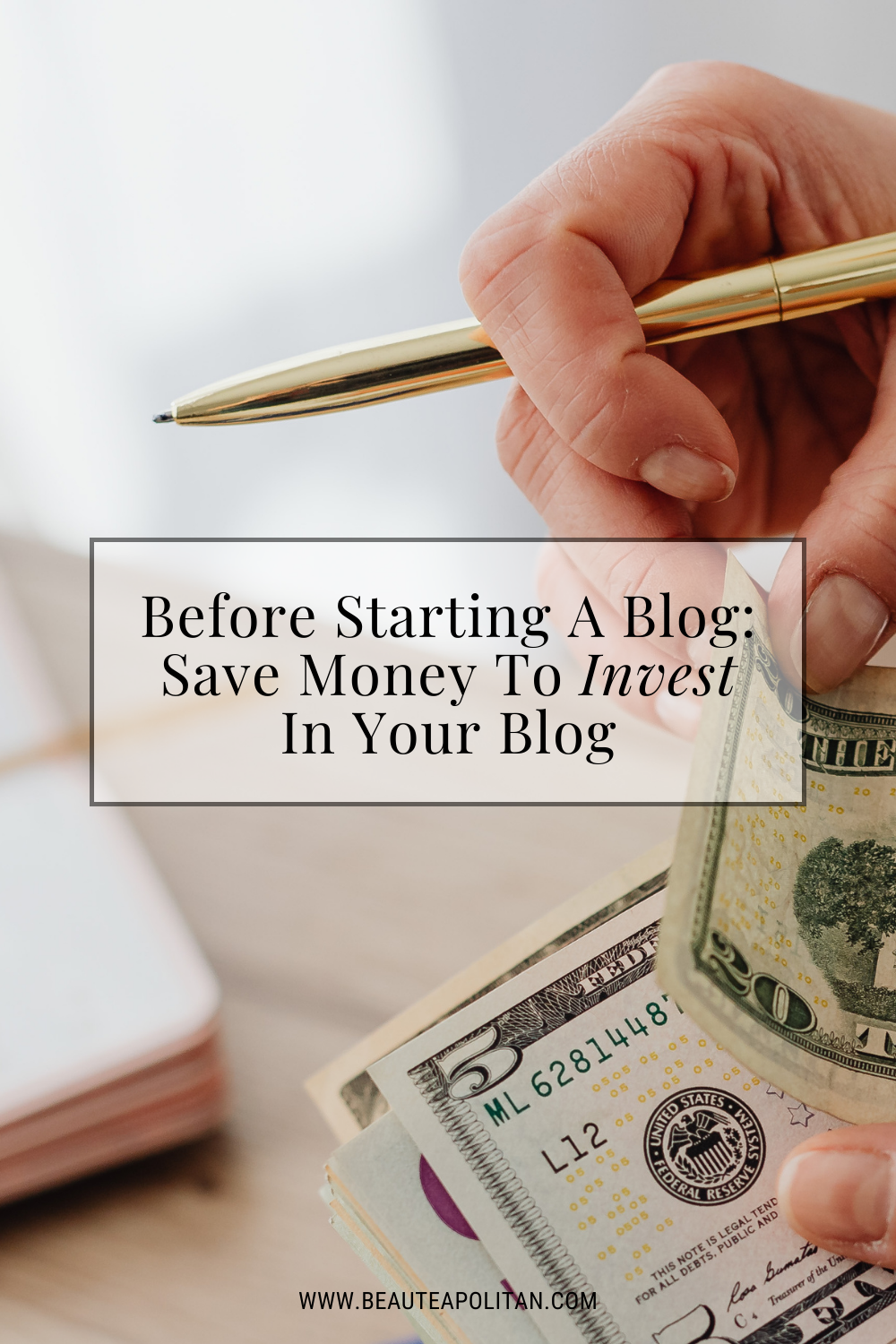
If you’re like me, you’re probably passionate about your blog and want to see it grow. But here’s the thing: building a successful blog often requires some investment.
Let’s help you figure out how to save money so you can invest in your blog smartly and check some practical steps you can take.
- Create a budget. Creating a budget might sound boring, but it’s crucial. List all your current expenses and see where you can cut back. Maybe you can skip that daily coffee shop visit or reduce your subscription services. The money you save can be redirected towards your blog. Even small savings add up over time.
- Use free resources. There are tons of free resources out there that can help you improve your blog without spending a dime. Platforms like Canva offer free design tools, and there are numerous free plugins for WordPress that can enhance your blog’s functionality. Take advantage of these before spending money on paid alternatives.
- Invest wisely. Prioritize spending on areas that will have the most significant impact, such as professional web design, SEO tools, and marketing. Research thoroughly to ensure you get the best value for your money, and test services with trial periods before making long-term commitments.
- Blogging courses. I’ve scoured the internet for a valuable course that doesn’t hurt my pockets that much. Luckily, I stumbled upon Sophia and after stalking her for months, I bought her courses. Read my experience and review on the Perfecting Blogging course here.
Saving money to invest in your blog doesn’t have to be overwhelming. By setting clear goals, creating a budget, prioritizing your investments, using free resources, networking, and tracking your progress, you can pave the way for long-term success.
Remember, every little bit helps, and smart investments can make a significant difference.
Do you find any of these helpful? And at what stage are you now in your blogging journey? I’d love to know in the comments below!
This post was all about the 11 secrets most blogging “experts” didn’t want you to know before starting a blog in 2025.
